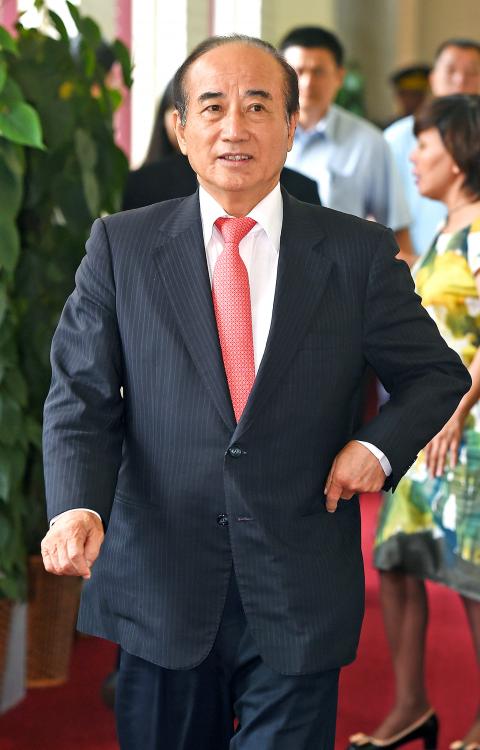Legislative Speaker Wang Jin-pyng (王金平) yesterday again turned down Chinese Nationalist Party (KMT) prospective presidential candidate and Deputy Legislative Speaker Hung Hsiu-chu’s (洪秀柱) invitation to direct her campaign after Hung suggested in an interview the day before that Wang’s participation would help put an end to gossip.
“I have been very clear on the reasons why I cannot accept the position of campaign director. I hope [Hung] would not put me in a difficult position. Putting me in a difficult position is tantamount to putting the legislature in a difficult position,” Wang said.
Wang had declined an offer last month, saying his neutrality and tight schedule precluded him from taking the job. He emphasized that, with the next legislative plenary session starting in September, he would have to deal with issues concerning draft legislation and question-and-answer sessions at the legislature.

Photo: Liao Chen-huei, Taipei Times
“What would happen to the legislature if [the deputy legislative speaker] runs for president and [the legislative speaker] exerts all his efforts on campaign work?” Wang said.
Asked about rumored efforts by some KMT members to obstruct Hung’s nomination with a signature drive, Wang said it is action being taken by individual party members and he would “try [his] best to dissuade them.”
Wang confirmed that he would attend the KMT’s national party congress scheduled for Sunday, when Hung is expected to be officially nominated as the party’s presidential candidate.
Hung later yesterday said that she would continue to ask for Wang’s help.
While she understands and respects Wang’s decision, it has already been demonstrated in Pingtung and Kaohsiung, where she visited in the past few days, that Wang’s help would be required, she said.
In an interview on Tuesday, Hung said Wang told her that “since he would definitely support the party’s legislative campaign, the presidential one is certain to be taken care of as well.”
“It is not possible for Wang to be absent from campaign activities for the party’s legislative candidates, but I would still hope that he could take a title [in the campaign team] to show that we are a team,” Hung said.
Hung said that she had talked to Wang about the importance of him having a role in her team, otherwise “people on the outside” would get the wrong idea about their relationship.
“I will ask KMT Chairman Eric Chu (朱立倫) [to persuade Wang] with me,” she said.
Separately yesterday, Hung told representatives of women’s groups in Kaohsiung that Taiwan must not fear a rising China, but should learn to make use of it, like a boat being lifted by a rising tide.
Amid China’s rise, she said, there has been opposition to stronger ties with China every step of the way, from opposing direct transportation links and free-trade agreements for both goods and services to fighting Taiwan’s bid to join the Asian Infrastructure Investment Bank.
The rise of China is a reality that Taiwan should not be afraid of, Hung said, adding that it should instead adopt a strategy that makes use of China’s rise.
Additional reporting by CNA

PREPAREDNESS: Given the difficulty of importing ammunition during wartime, the Ministry of National Defense said it would prioritize ‘coproduction’ partnerships A newly formed unit of the Marine Corps tasked with land-based security operations has recently replaced its aging, domestically produced rifles with more advanced, US-made M4A1 rifles, a source said yesterday. The unnamed source familiar with the matter said the First Security Battalion of the Marine Corps’ Air Defense and Base Guard Group has replaced its older T65K2 rifles, which have been in service since the late 1980s, with the newly received M4A1s. The source did not say exactly when the upgrade took place or how many M4A1s were issued to the battalion. The confirmation came after Chinese-language media reported

A Ministry of Foreign Affairs official yesterday said that a delegation that visited China for an APEC meeting did not receive any kind of treatment that downgraded Taiwan’s sovereignty. Department of International Organizations Director-General Jonathan Sun (孫儉元) said that he and a group of ministry officials visited Shenzhen, China, to attend the APEC Informal Senior Officials’ Meeting last month. The trip went “smoothly and safely” for all Taiwanese delegates, as the Chinese side arranged the trip in accordance with long-standing practices, Sun said at the ministry’s weekly briefing. The Taiwanese group did not encounter any political suppression, he said. Sun made the remarks when

The Taiwanese passport ranked 33rd in a global listing of passports by convenience this month, rising three places from last month’s ranking, but matching its position in January last year. The Henley Passport Index, an international ranking of passports by the number of designations its holder can travel to without a visa, showed that the Taiwan passport enables holders to travel to 139 countries and territories without a visa. Singapore’s passport was ranked the most powerful with visa-free access to 192 destinations out of 227, according to the index published on Tuesday by UK-based migration investment consultancy firm Henley and Partners. Japan’s and

BROAD AGREEMENT: The two are nearing a trade deal to reduce Taiwan’s tariff to 15% and a commitment for TSMC to build five more fabs, a ‘New York Times’ report said Taiwan and the US have reached a broad consensus on a trade deal, the Executive Yuan’s Office of Trade Negotiations said yesterday, after a report said that Washington is set to reduce Taiwan’s tariff rate to 15 percent. The New York Times on Monday reported that the two nations are nearing a trade deal to reduce Taiwan’s tariff rate to 15 percent and commit Taiwan Semiconductor Manufacturing Co (TSMC, 台積電) to building at least five more facilities in the US. “The agreement, which has been under negotiation for months, is being legally scrubbed and could be announced this month,” the paper said,